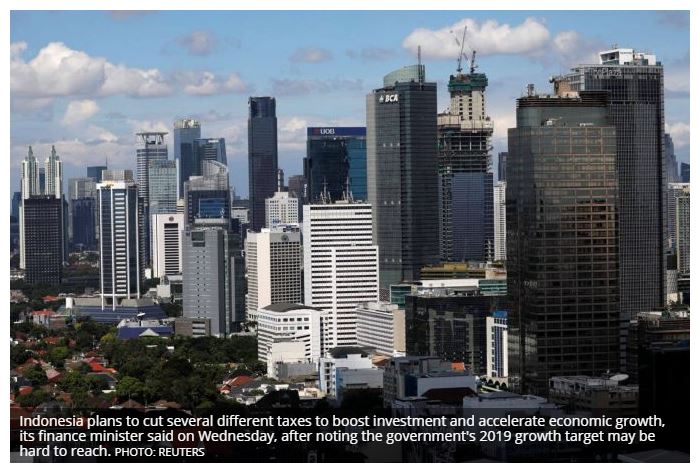Indonesia plans more tax breaks to lift GDP growth
[JAKARTA] Indonesia plans to cut several different taxes to boost investment and accelerate economic growth, its finance minister said on Wednesday, after noting the government’s 2019 growth target may be hard to reach.
South-east Asia’s largest economy in the first quarter expanded 5.07 per cent from a year earlier, missing market expectations, leading Sri Mulyani Indrawati to tell parliament last week that the government’s 5.3 per cent growth target may not be achieved.
Some analysts say fiscal stimulus may be more effective at keeping Indonesia’s growth momentum for now, rather than monetary easing, due to a lag time in monetary transmission.
The government raised the price threshold at which luxury sales tax is applied to houses and apartments to support the property sector and encourage home buying, according to a statement posted on the website of the office of the cabinet secretary on Wednesday.
The 20 per cent tax now applies only to any purchase of a landed property or apartment worth at least 30 billion rupiah (S$2.87 million), it said.
The previous threshold for a landed property was 20 billion rupiah, and 10 billion rupiah for an apartment.
The income tax rate for infrastructure-related securities would be cut to 5 per cent from 15 per cent, Indrawati also said in a separate statement from the same website, giving no timeline of when this goes into effect.
Previously announced plans for a “super deductible tax” incentive, that allows a company to deduct its taxes at double the amount it invests in skills training and triple the size of its investment in research and development, will soon be issued, Indrawati said.
However, she said a plan to trim corporate tax rate to 20 per cent, from the current 25 per cent, still needs further study “to calculate how fast, how big the fiscal risk is and to determine how to implement it”.
Changes to the corporate tax rate require parliamentary approval.
Bank Indonesia is expected to keep its benchmark interest rate steady at a policy review to be concluded later on Thursday, but it may begin to follow other Asian central banks by cutting later this year, a Reuters poll showed.
REUTERS


 English
English




